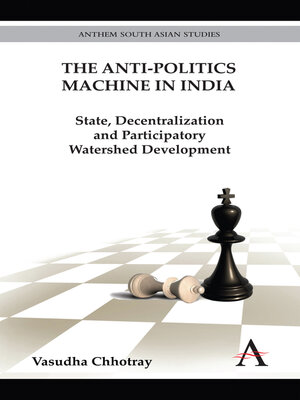The Anti-Politics Machine in India
ebook ∣ State, Decentralization and Participatory Watershed Development · Anthem South Asian Studies
By Vasudha Chhotray

Sign up to save your library
With an OverDrive account, you can save your favorite libraries for at-a-glance information about availability. Find out more about OverDrive accounts.
Find this title in Libby, the library reading app by OverDrive.



Search for a digital library with this title
Title found at these libraries:
| Library Name | Distance |
|---|---|
| Loading... |
This book assesses the validity of 'anti-politics' critiques of development, first popularised by James Ferguson, in the peculiar context of India. It examines the new context provided by decentralization of state functioning where keeping politics out of development (development as the anti-politics machine) can no longer be taken for granted. The case of a highly technocratic state watershed development programme that also seeks to be participatory is used to illustrate the tensions between prescriptive development policy and a growing political democracy.
|This book assesses the validity of 'anti-politics' critiques of development, first popularised by James Ferguson, in the peculiar context of India. Ferguson's memorable metaphor of development as an Anti-Politics Machine – that serves to entrench state power and depoliticize development – continues to appeal to those cynical of the widespread tendency of development discourses to treat various issues apolitically. The book examines this problem in India, a country where development planners after independence adopted a scientific stance and claimed to distance themselves from mass politics, but also one where the groundswell of democratic political mobilization has been considerable in recent decades. In a country with an extremely differentiated landscape of authority and diverse politics, what does it mean for the state to undertake a project (or indeed, projects) of depoliticization; for as scholars inspired by Foucault and Gramsci have variously agreed, depoliticization is a tentative project where outcomes are far from certain. The book examines these questions within the new context provided by decentralization, the potential of which to reorganize relationships amongst different levels of the state greatly complicates the very pursuit of depoliticization as a coherent state practice. It looks at these issues through a highly technocratic state watershed development programme in India that has witnessed key transformations towards participation in recent years.







